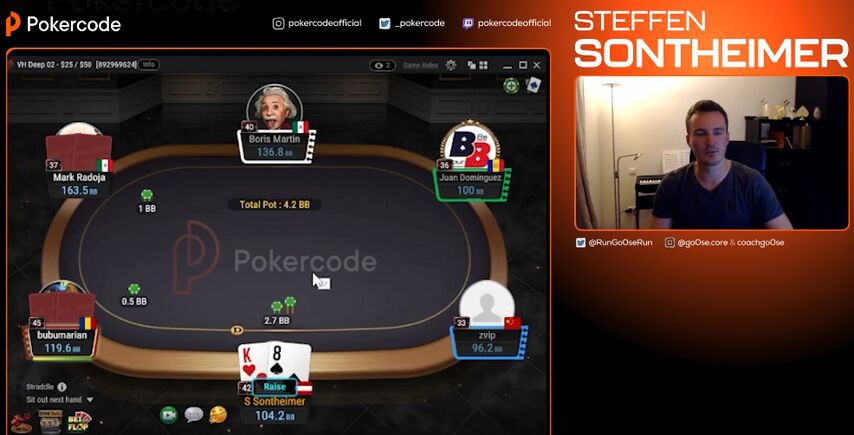
With K8o, I increase the size of the raise because the player in the small blind is not 3-betting wide enough.
The small blind folds and the BB calls.
Flop (5.9bb):
BB checks.
We put a small continuation bet in with trips.
Bet 1.6bb. BB calls.
Turn (9.1BB):
BB checks.
K8o is not the best trips in the world, but I still have an easy triple barrel.
Bet 6.8bb. BB calls again.
River (22.7bb):
BB checks.
K8o is not strong enough for an overbet, but of course you still need to bet it with a smaller sizing. I hope he hits a pair with his queen of spades on the river.
Bets 17bb, Villain instantly folds.
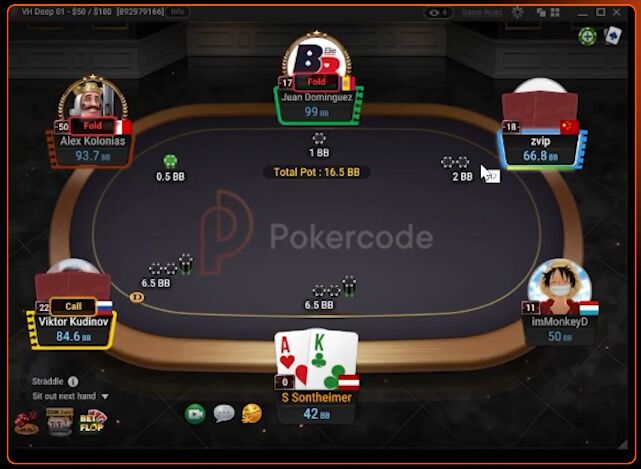
3-bet against an amateur and got a cold call in position from Victor – a very strong player! Most likely, the presence of an amateur in the hand influenced his decision.
The raiser calls.
Flop (21bb, effective stack 42bb):
The player in first position checks.
Victor's range has many pocket pairs of tens and jacks, as well as AQs. Maybe he has nines and eights. My iso range against the amateur is weaker, so I'll start by checking.
Checks. Viktor bets 6.9bb. The player in first position calls.
Against a bet from a player with a very strong range and a call from a guy who could have anything, our AKo unfortunately has to fold. My checking range is protected by QQ+, which I will often check-shove.
Folds.
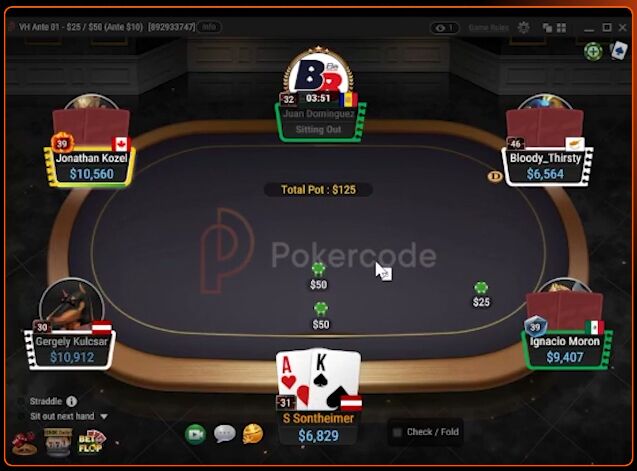
We continue to practice playing AKo, so far this hand is not going very well.
The button folds, the small blind limps and calls the 3.8bb raise.
Flop (8.6bb):
SB checks.
Ignacio Shouldn't Limp Call , so we are ahead fairly often. In all its range, we are only beaten by and . Therefore, we can immediately start with a very large bet, since our range is full of all sorts of garbage.
Bet 12.9bb. The SB calls.
Turn (34.4bb):
SB checks.
There are now two flush draws on the board. made a straight, improved. I have to think about how best to continue... Perhaps I should continue to bet. Although I could be wrong – I'm not that great with a node that starts with a limp call.
Bet 41.8bb. The opponent folds.
Glad the giveaway is over! (Checks the river, it's an offsuit eight.) On this river I wouldn't have any questions, but there are a lot of rivers where I would have a hard time.
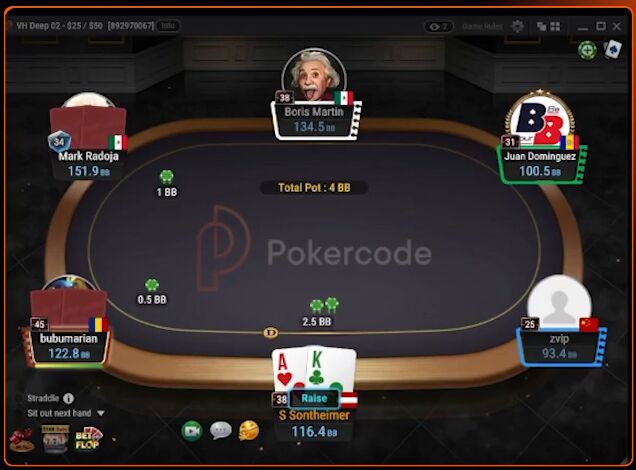
We continue to play !
The SB folds, the BB calls.
Flop (5.5bb):
BB checks.
On this flop, we have several options to play.
Bet half pot, 2.8bb. BB raises to 7.2bb.
The check-raise will be and and various straight draws. Overall, I'm pretty good against this range, and unless a king or an ace on the turn improves him, he shouldn't continue to barrel. I will call.
Calls.
Turn (19.9bb):
Decent card, he should check with a draw like and .
Opponent checks.
I think he has more gutshots than . I prefer to bet to keep gutshots from realizing equity, although checking with AKo is great.
Bet 5.4bb. The opponent folds. Steffen checks the river - .
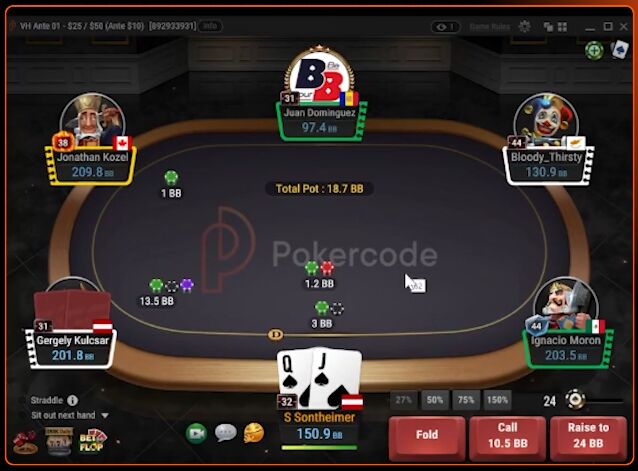
Because of the ante, I increased the size of the open from the button, but Gergely matched this with an increased 3-bet size. I have an obvious call, I can't think of anything else.
Calls.
Flop (29.2bb):
Opponent checks.
With I have to mix bet and check. This time I will go for a bet.
Bet 7.9bb. Gets called.
Turn (45bb):
Opponent checks.
Five is not the card I would like to see. All of my overcards and top straight draws didn't improve at all. My suit is also not very good – I block spades and . Will have to check.
Checks back.
River (45bb):
Opponent checks.
There are in his range lots of , , , but there may be , for example. I don't have the right to bluff all the time. It's not entirely clear which of the hands I represent on the river that checked the turn. Okay, I'll check.
Opponent wins with .
Eh... Well, the expectation of checking and bluffing was the same, and the randomizer gave me 55...
Of course, I would have to deal with this runout – what should I bluff with, because I bet the flop with a very wide and varied range and have to worry about check-raising on the turn. What should I do more often with hands with equity – check the turn or bet? It depends on how often this nine will suit us. How often do I check ? Many questions.
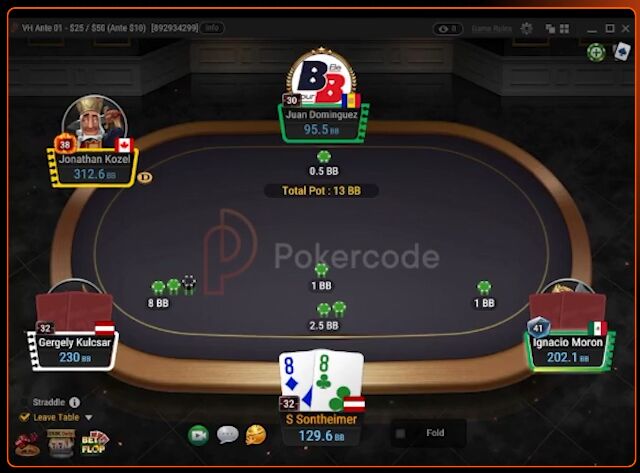
I think this 3-bet sizing with the ante forces me to call with all my pocket pairs – a very good price! Let's see the flop.
Calls.
Flop (18.5bb):
There is absolutely nothing to see here.
Check-fold to 10.2bb.
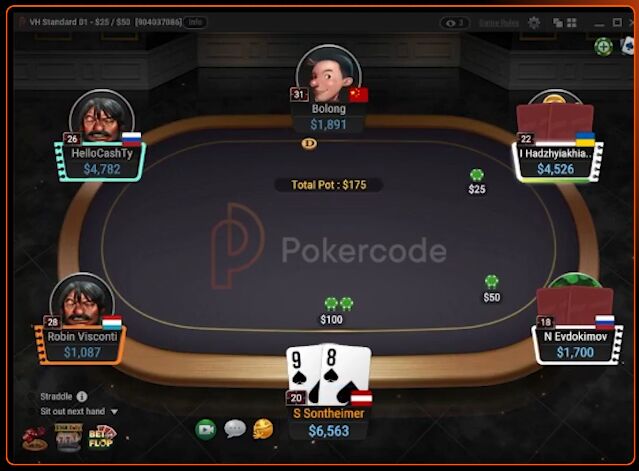
There are several people at the table with short stacks, so I reduce the open sizing from UTG to a min-raise.
Everyone before the BB folds, the BB calls.
Flop ($225):
BB checks. Steffen bets $60.
Seems like a normal continuation bet. I'm UTG, I can have anything. Perhaps the sizing could even be reduced.
Villain calls and checks the turn.
Turn ($346):
In general, a ten is a very good card for my range. and receive additional outs, makes the nuts, improved to second pair. However, the nine, of course, is too strong to be turned into a bluff. I'll try to get to showdown, win against A-high and and chop with other .
If he blocks bet I should bluff catch with a part and , and also have some number of .
River ($346):
Both players check. The player in the big blind shows .
Oh oh oh! Basically, the shorter your stack, the more you want to trap the invulnerable nuts. With his line he blocks everything in your range. He doesn't need to check-raise on the flop, since he can build a stack over the remaining two streets. He knows that I check some on the turn, and can also bluff on the river, so gives me a chance to bet and checks the river. Then it is very easy for him to build a check-push range, around , of course, and it is very difficult for me to respond correctly. With a three, he probably would have bet himself. Good hand.
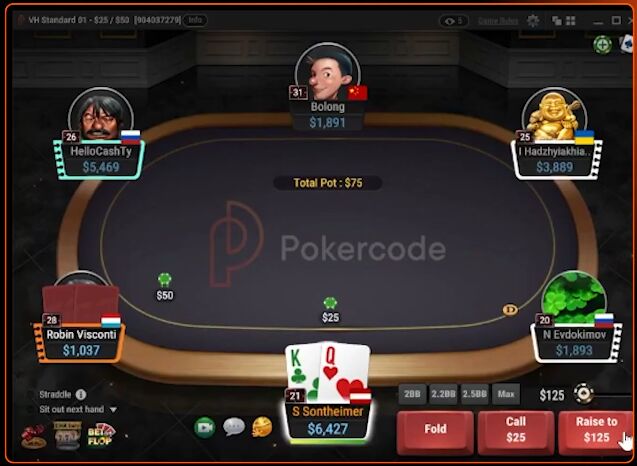
I don't really like limp calls and open jams, I'll start with a regular raise call.
Raises to $125, Villain calls.
Flop ($250):
A great board to c-bet with your whole range and bet all the chips on the next streets after getting called by some weaker hands.
He bets $67. The opponent folds.
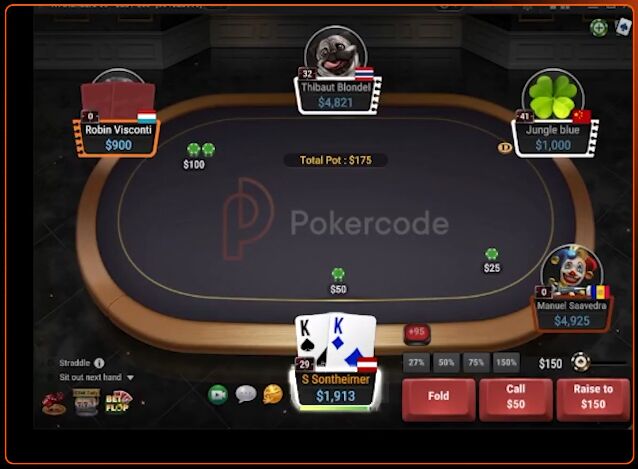
In my tournament world, against players with 20bb stacks, it's time to start trapping. Not sure if this is true against early position opens though. Rather, I tend to all-in. Against the button, which has a lot of hands like , calling looks great because it's to my advantage to let him hit the flop. The early player has a lot , which stack preflop but don't give up the stack on every flop.
However, let's try to trap!
Calls.
Flop ($225, $900 effective stack):
On this texture, of course, I will play the kings as quickly as possible.
Checks. Opponent bets $50.
There is no need to check-push against this sizing, I will spread the game over two streets.
Check-raise to $242. Villain calls.
Turn ($710, effective stack $657):
So, is it still a push? Or can I somehow play two more streets, given that the turn came a complete brick? Perhaps the second,I don’t really need to defend myself.
He bets $212. The opponent pushes quickly. Steffen calls and wins both runs against .
That was nice.
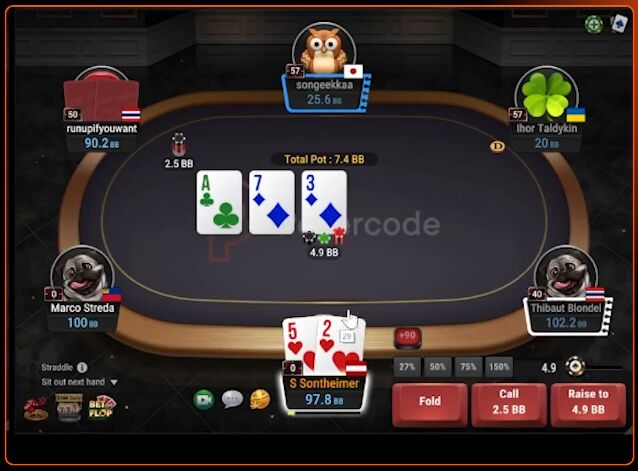
Interesting situation! This is a frequent check-raise against a small continuation bet. Alas, his sizing is a bit too big, meaning his range is a bit stronger, forcing me to check-raise a stronger range as well. I still have to check-raise this hand sometimes, but call more often, and this time I called.
Turn (9.8bb):
Both check.
River (9.8bb):
So let's try to identify the weakest hands in my range. My float range is diamond hands , , . It looks like all the draws have hit, and hitting a deuce is the weakest I have. That's why I have to bluff. What sizing? Large.
Bet 9.8bb. The opponent folds.
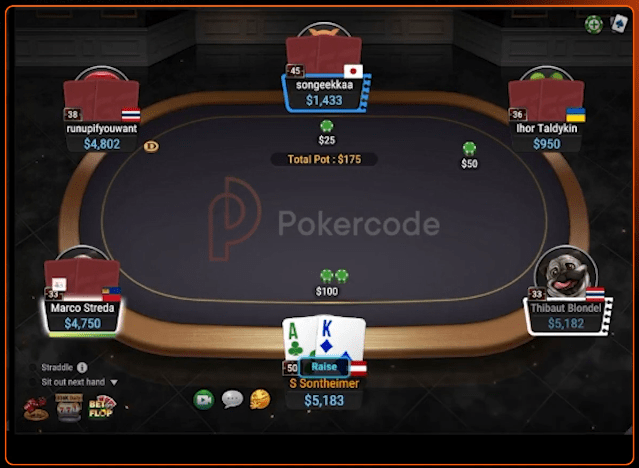
Reduced sizing due to the short stack in the BB.
Only the player in the small blind calls.
Flop ($250):
SB checks.
Oh, it wasn't the big blind that called, it was the small blind. It's good because BB hits this board better, my EV has gone up.
He bets $67. Villain check-raises to $452.
Just in case, I'll check my noteS. So, sets on the flop are slowplaying. We seem to have the best hand for the most part, but I see no reason to push him all-in on the flop. Take a stack from maybe on the turn.
Calls.
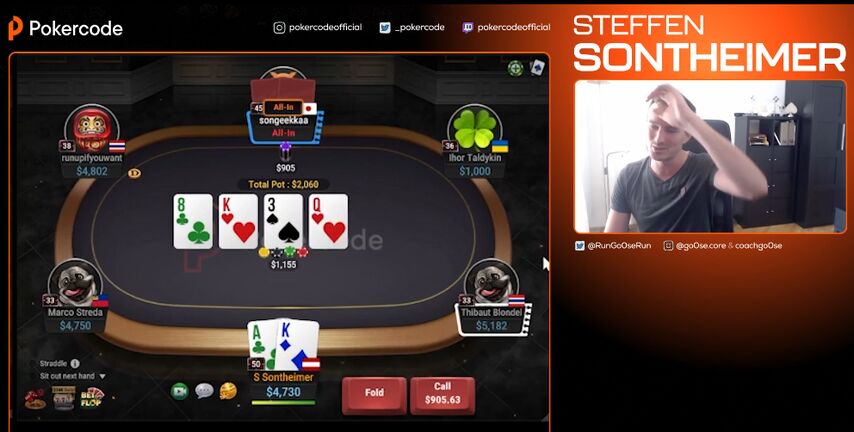
OK. I still won’t throw it away, but he has a lot and it's terribly disgusting.
Calls and splits with .
Okay, same hand. Played well, all is well.
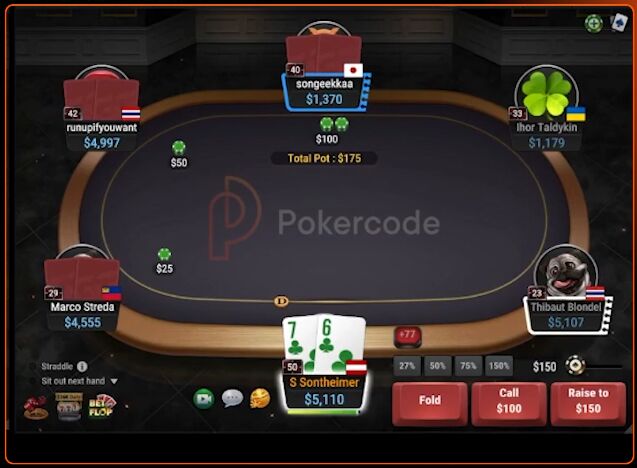
Hmm, a very happy call with an ante, but without... There is a potentially weak player in the big blind, so call anyway. I want to play more hands with an open raiser, but don't overdo it.
Calls. The small blind calls, the BB folds.
Flop ($350):
The SB checks and the raiser bets $175.
Sucks. In 100bb stacks, I usually have the option to raise and then bluff with a blocker for a set, but this is not possible here. You have to call the flop and usually fold the turn.
Calls. MB folds.
Turn ($700, effective stack $1,195):
Opponent bets $350. Steffen folds.
With the weak short stack, I want to go loose, but with a slightly different type of hands. Call a little more often with , , to catch a top pair on the flop that is strong enough to stack off for 30 blinds. The call with 76s was probably bad. Make straights and flushes for 30 blinds? Oh no.
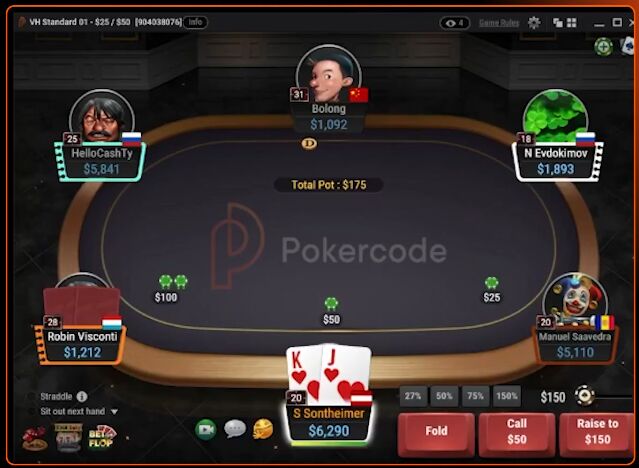
How many blinds are there, 26? It is always worth clarifying, do not rush to press call. Maybe it's a shove – I'm getting some better offsuit hands to fold. Is he raising-folding AJo and KQo here? Push can be great. In general, I have no idea whether this is true or not, but by feel the push is excellent. Well, let's go.
Puts all-in. The opponent folds.
Probably AKo should be in the shoving range as well? It is necessary to mark this hand for analysis. I'm always happy to find a situation in which I have no idea about the correct preflop – there is room to grow. Tournament experience helps solve problems with antes, but without antes, all ranges are slightly different. I can still use logic, but obviously it doesn't hurt to work out.











